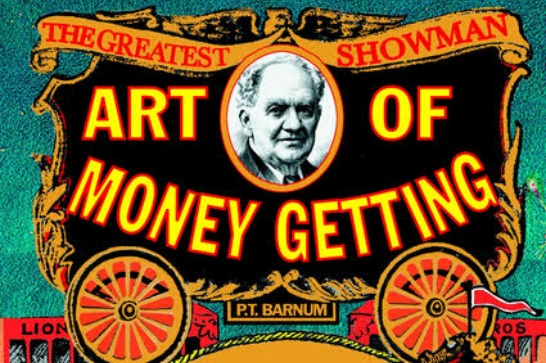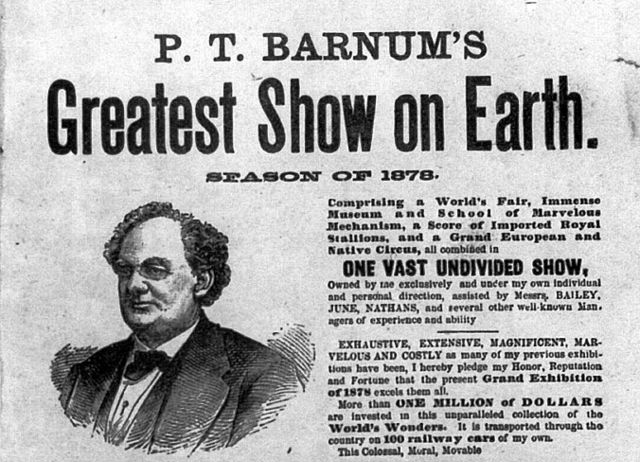P.T. Barnum’s Forgotten Book “The Art of Getting Money” – Ch. 4
We are doing a series here at BBH on The Art of Getting Money, a little-know book from P.T. Barnum wrote back in 1880.
Why? A couple reasons. First, because there’s a movie coming out December 25, 2017, starring Hugh Jackman, called The Greatest Showman.
It’s a musical about the life of P.T. Barnum.
I don’t know a lot about the movie yet, but it looks pretty good from what I’ve seen in the trailer…
The Greatest Showman – Official Trailer
P.T. Barnum’s Little-Known Book from 1880
So I thought it’d be cool to feature his little-known book The Art of Money Getting or Golden Rules for Making Money (It’s in the public domain, so it’s ok for me to post it on this site)
Some of you might not know this, but Barnum is FALSELY known for saying, “There’s a sucker born every minute,” (He actually didn’t say that.)
The second reason I thought it would be good to do this is series is because this book contains some surprisingly practical and helpful advice on how everyday people can better manage their income and increase their wealth.
The book is 137 years old, but much of the advice he gives is still applicable to all of us today.
That’s why I’ve decided to post a new segment of the book once a week here on BayBusinessHelp.com.
Today you will be able to read chapter 1 about choosing your vocation (i.e. what you do for a living).
Reminder of 4 Things Before You Read the Book
1. DISCLAIMER:
I don’t agree with everything that P.T. Barnum did during his life.
I also don’t agree with every single thing he wrote in his book.
I don’t even agree that wealth is, or should be, the primary goal in life. (There are plenty things that are more important than wealth!)
But I DO believe that all of us can benefit from learning how to better handle the money (however small or great) that flows in and out of our hands.
And this book contains some advice that I think you will find both interesting and helpful for you when it comes to how to better handle your money.
2. MY ADVICE TO READERS:
Take the good advice and leave the bad!
3. THE ONLY CHANGES I’VE MADE:
The only changes I’ve made to the text are:
- I’ve broke many of the paragraphs into smaller chunks of text to make it easier to read.
- I’ve also bolded or italicized sections of the text to help them stand out to the reader.
- I also occasionally include a modernized word to help the reader understand an old school word or phrase that Barnum uses.
- And I’ve also added some headers to the text, made some quotes stand out, and bulleted some of his points to make sections stand out for the reader.
4. SOME OF IT MIGHT BE OFFENSIVE
Because of the way spoke and thought back in the 1800’s compared to now, you shouldn’t be surprised if some of the content is offensive to our current standards and way of thinking.
If you can’t just ignore this, like I do, and you will be offended, then you probably shouldn’t read any of the posts from this series.

What We’ve Covered So Far
If you missed the previous posts in this series, you can read them here:
Introduction to The Art of Money Getting
— The Art of Money Getting – Chapter 1: Right Vocation–
— The Art of Money Getting – Chapter 2: Right Location —
— The Art of Money Getting – Chapter 3: Avoid Debt —
FYI – After formatting and preparing the chapter below for you, I’ve got to say that Barnum gives some really great insight about money and debt.
I think you’re really going to like it…
— The Art of Money Getting: Chapter 4: PERSEVERE —
When a man is in the right path, he must persevere.
I speak of this because there are some persons who are “born tired;” naturally lazy and possessing no self-reliance and no perseverance. But they can cultivate these qualities, as Davy Crockett said:
“This thing remember, when I am dead: Be sure you are right, then go ahead.”
You Must Cultivate Go-Aheaditiveness
It is this go-aheaditiveness, this determination not to let the “horrors” or the “blues” take possession of you, so as to make you relax your energies in the struggle for independence, which you must cultivate.

“How many have almost reached the goal of their ambition, but, losing faith in themselves, have relaxed their energies, and the golden prize has been lost forever.”
It is, no doubt, often true, as Shakespeare says:
“There is a tide in the affairs of men, Which, taken at the flood, leads on to fortune.”
If you hesitate, some bolder hand will stretch out before you and get the prize. Remember the proverb of Solomon: “He becometh poor that dealeth with a slack hand; but the hand of the diligent maketh rich.”
Perseverance is sometimes but another word for self-reliance.
Many persons naturally look on the dark side of life, and borrow trouble. They are born so.
Then they ask for advice, and they will be governed by one wind and blown by another, and cannot rely upon themselves. Until you can get so that you can rely upon yourself, you need not expect to succeed.
I have known men, personally, who have met with pecuniary reverses, and absolutely committed suicide, because they thought they could never overcome their misfortune.
But I have known others who have met more serious financial difficulties, and have bridged them over by simple perseverance, aided by a firm belief that they were doing justly, and that Providence would “overcome evil with good.”
You will see this illustrated in any sphere of life.
The Example of Two Generals
Take two generals; both understand military tactics, both educated at West Point, if you please, both equally gifted; yet one, having this principle of perseverance, and the other lacking it, the former will succeed in his profession, while the latter will fail. One may hear the cry, “the enemy are coming, and they have got cannon.”
“Got cannon?” says the hesitating general. “Yes.”
“Then halt every man.”
He wants time to reflect; his hesitation is his ruin; the enemy passes unmolested, or overwhelms him; while on the other hand, the general of pluck, perseverance and self-reliance, goes into battle with a will, and, amid the clash of arms, the booming of cannon, the shrieks of the wounded, and the moans of the dying, you will see this man persevering, going on, cutting and slashing his way through with unwavering determination, inspiring his soldiers to deeds of fortitude, valor, and triumph.





